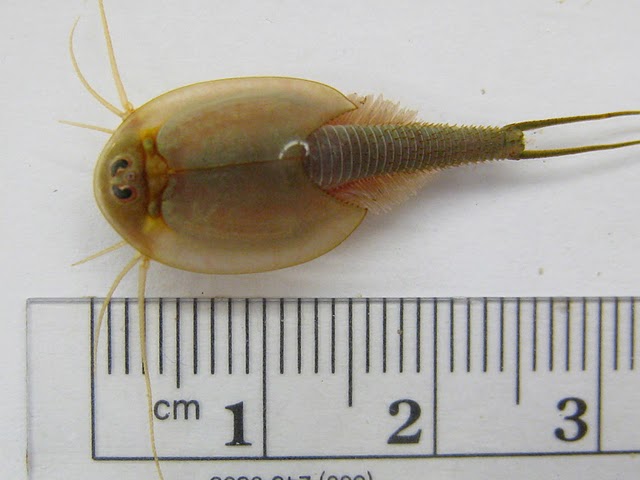California Agricultural Technology Institute
Shrimp pest control in sight
More than a decade of work by Fresno State biologist set to benefit California rice industry
After 12 years of research and development work on behalf of California rice producers, a Fresno State biologist is looking for a commercial partner to market a product that will help control one of the rice industry’s most serious pests – tadpole shrimp.
 Biology Department Professor Brian Tsukimura received a patent to support commercial
production of a food pellet that will reduce shrimp pest populations – without the
use of any toxic chemicals.
Biology Department Professor Brian Tsukimura received a patent to support commercial
production of a food pellet that will reduce shrimp pest populations – without the
use of any toxic chemicals.
Tsukimura began his work on tadpole shrimp (Triops longicaudatus) control more than a decade ago at the request of Central Valley rice growers who were experiencing crop losses to the small, freshwater crustacean that feeds on newly-planted rice seedlings.
“Each spring, irrigation of the rice fields promotes development of cysts produced by tadpole shrimp adults that thrived in previous seasons,” Tsukimura explained.
“After hatching, the juvenile shrimp  develop rapidly, requiring a significant food supply. It is in their search for food
that the tadpole shrimp cause devastating damage to the rice cotyledons, which are
dislodged, preventing proper rooting.”
develop rapidly, requiring a significant food supply. It is in their search for food
that the tadpole shrimp cause devastating damage to the rice cotyledons, which are
dislodged, preventing proper rooting.”
Growers have reported field losses of from 10 to 20 percent in commercial operations, Tsukimura noted.
For many years, a chemical called copper sulfate (also known as Bluestone) was used effectively by the industry to control tadpole shrimp. However, it is labeled a Class I hazardous material, and increased environmental concerns in the last decade have prompted California and federal regulatory agencies to clamp down on its use, to the point of near complete restriction this past year. In addition, organic farmers are allowed to use Bluestone only once every two years, creating a need for an alternative method of tadpole shrimp control.
In beginning his research on new methods of tadpole shrimp control,
Tsukimura assembled a student research team to focus on a chemical called methyl farnesoate,
a naturally occurring hormone known to slow reproduction rates by inhibiting ovary
development in females.
Over several years of testing the researchers assessed and verified the effectiveness of the hormone. Once that was accomplished, Tsukimura faced a new challenge: develop a method to get it into the pest’s system. During additional years of trials, the team developed a food pellet that will effectively deliver it.
“The incorporation of the hormone into the pellets was the basis of our patent application,” Tsukimura said. “We are proposing a low-cost pellet with minimal nutritive value, but a methyl farnesoate payload to reduce tadpole shrimp reproduction.”
The work included a research partnership with scientists from the University of California Cooperative Extension and commercial-level testing at Koda Farms of Dos Palos.
During the patenting stage, Tsukimura teamed with Monterey AgResources of Fresno in an effort to bring the pellets into commercial production for use by organic farmers. However, in an unexpected turn of events, MontereyAg was just recently purchased by an out of state company that is no longer expanding its organic market, Tsukimura reported.
“So, we are now looking for a company that would like to partner with us to produce and market this product,” he said.
Tsukimura said he and his research team are continuing physiological studies on the methyl farnesoate effects in order to “build a better pellet.”
For additional details on his work, contact the researcher at briant@csufresno.edu.
Partial funding for this project was provided by the California State University Agricultural Research Institute (ARI).